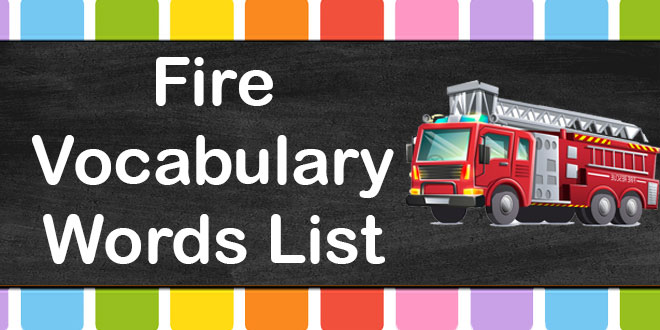You have reached this interesting post as you might be among those who have asked the following questions: what is a fire vocabulary words list? fire station words & expressions? firefighter vocabulary pdf? firefighter slang terms? fire vocabulary words? fire-based words? words associated with fire and heat? words and phrases related to fire? What is fire terminology? if so, you have come to the right place.
In general, learning and understanding words and expressions related to fire and fire station is of primary importance to language learners who intend to master the English language.
This post covers essential and useful words and expressions related to fire and fire brigade.

Fire Vocabulary Words List
1. Fire brigade
a body of firefighters, an organized body of people trained and employed to extinguish fires.
2. Fire service
also known as the fire department in US English; service is an organization which has the job of putting out fires.
3. Fire drill
a situation in which people practise what they must do in order to leave a building safely if there is a fire.
4. Firefighter
also known as fireman/ firewoman. a person whose job is to extinguish fires. Firefighters also rescue people in dangerous situations, such as car accident victims or people who are stuck in lifts, etc.
5. Fireproof
proof against or resistant to fire. something that cannot be damaged by fire.
6. Fire engine
also known as a fire truck in US English. A vehicle equipped for firefighting, now usually a motor truck having a motor-driven pump for shooting water or chemical solutions at high pressure.
7. Fire station
A building housing fire apparatus and usually firefighters.
8. Fire escape
a device for escape from a burning building; especially: a metal stairway attached to the outside of a building.
9. Fire exit
a door that is used to let people out of a building when there is a fire.
10. Ladder
a structure consisting of a series of bars or steps between two upright lengths of wood, metal, or rope, used for climbing up or down something.
11. Fire hose
a long high-pressure flexible, rubber tube that carries water or, other fire retardants such as foam to a fire to extinguish it.
12. Fire hydrant
a discharge pipe with a valve and spout at which water may be drawn from a water main. Fire hydrants might be placed inside or outside a building, parking area, industrial area, roadsides, etc..
13. Cherry picker
also known as a “boom lift· or a “hydra-ladder”. A type of mechanical ladder that has a large open box that is often mounted on the back of a vehicle, used for raising and lowering people
14. Fire helmet
a hard hat worn by a firefighter as a defense against falling materials from burning structures.
Words Associated with Fire and Heat: Types of Fire
blaze
- meaning: a large, intense and fiercely burning fire that is difficult to control
- example: twelve firemen fought the blaze
inferno
- meaning: a large burning fire that is dangerously out of control and causing a lot of destruction.
- example: the inferno had swept through the small town
bonfire
- meaning: large open-air fire used for burning trash, or as part of a celebration
- example: they made a bonfire with all the old leaves and paper.
campfire
- meaning: an open-air fire in a camp, used for cooking and as a focal point for social activity.
- example: The boys sat around a campfire swapping stories
conflagration
- meaning: a disastrous fire that burns over a large area and destroys property
- example: The conflagration destroyed the warehouses
flame
- meaning: a hot, bright stream of burning gas that comes from something on fire
- example: The heat from the flames was Intense
glow
- meaning: a dull, steady light produced by a fire when there are no flames
- example: Our family enjoyed the warmth of the glow from the fire in our backyard
Fire Reading Comprehension Passages with Questions
Read the text below then answer the questions
The summer of 1871 was very dry, leaving the ground parched and the wooden city vulnerable. On Sunday evening, October 8, 1871, just after nine o’clock, a fire broke out in the barn behind the home of Patrick and Catherine O’Leary at 13 DeKoven Street. No one knows how the fire started, but fingers were pointed at the O’Leary’s cow, who supposedly kicked over a lantern.
The firefighters, exhausted from fighting a large fire the day before, were sent at first to the wrong neighborhood. When they finally arrived at the O’Leary’s, the fire was raging out of control. The blaze quickly spread east and north. Wooden houses, commercial and industrial buildings, and private mansions were all consumed in the blaze.
After two days, rain began to fall. On the morning of October 10, 1871, the fire died out, leaving complete devastation in the heart of the city. At least 300 people were dead, 100,000 people were homeless, and $200 million worth of property was leveled. The fire was one of the most spectacular events of the nineteenth century, and it is recognized as a major event in the city’s history.
The disaster caused an outbreak of looting and lawlessness. Companies of soldiers were summoned to Chicago and martial law (rules put in place when there is a disaster that are enforced by the federal government) was declared on October 11, ending three days of chaos. Martial law was lifted several weeks later.
Today, the Chicago Fire Department training academy is located on the site of the O’Leary property where the Great Chicago Fire started. In 1997, the Chicago City Council passed a resolution exonerating Catherine O’Leary, an Irish immigrant who died in 1895, and her cow.
The reading passage is adapted from: history com/topics/great-Chicago-fire
Reading Comprehension
1. What is another word or phrase for…
- Extremely dry and thirsty
- Law or proclamation passed by officials
- Looking to blame someone
- Totally tired and worn out
- Huge homes
- Stealing from businesses
- Called in to help by an order from the governor
- A burning fire
2. Answer the comprehension questions
- What season of which year did the Great Fire start?
- What mistake happened that allowed the fire to get out of control quickly?
- What were most of the buildings in the city made of?
- How many days did the fire rage?
- What helped it (the fire) burn out?
- Why do you think companies of soldiers were called in to keep order?
- Who was Catherine O’Leary?
- Do you think people in 1871 were more vulnerable to a large fire like this than if it happened today?
3. Match the vocabulary with the definition
| devastation | total lack of structure or control, anarchy |
| consumed | clearing one’s name of suspicion |
| spread | completely destroyed, flat |
| commercial | related to factories and places of work |
| industrial | weak and in danger |
| exonerating | eat up or destroy until nothing is left |
| vulnerable | amazing and hard to believe |
| leveled | to expand and multiply, get bigger |
| spectacular | damage and destruction |
| chaos | related to businesses, not homes |




Leave a Reply